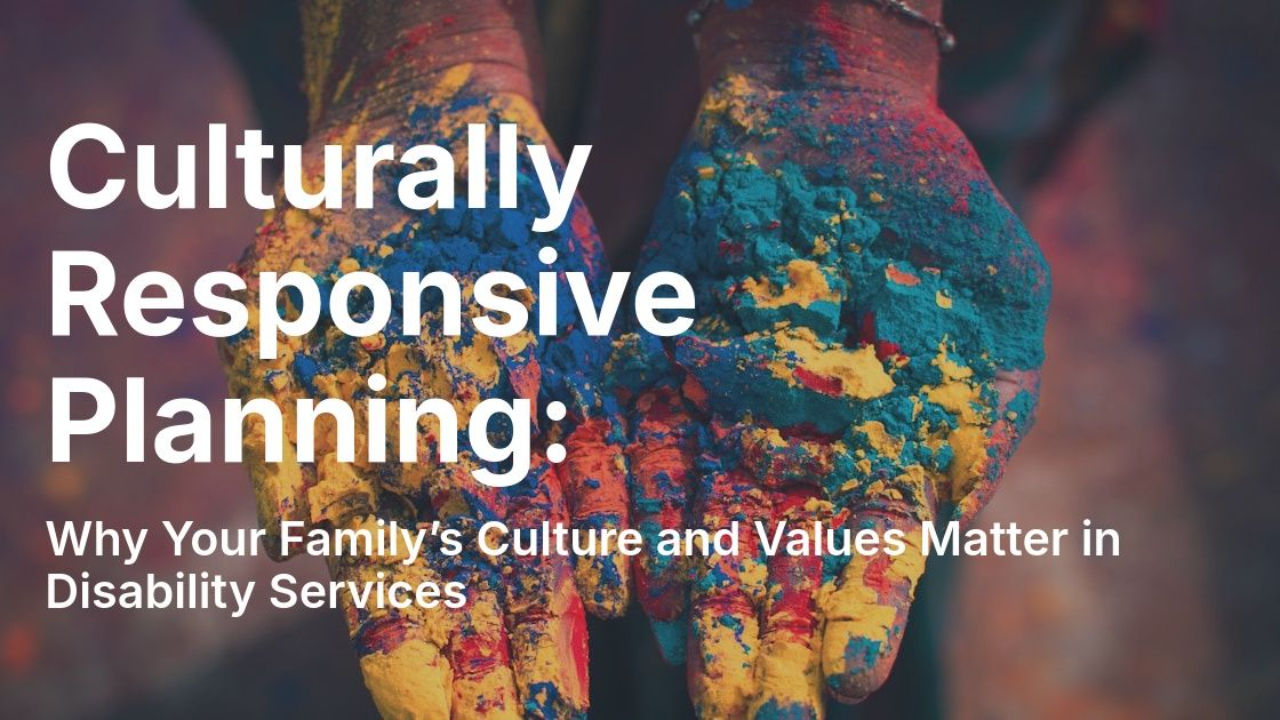Culturally Responsive Planning: Why Your Family’s Culture and Values Matter in Disability Services

When it comes to disability services, it’s not just about what supports are available—it’s about whether those supports truly reflect your family’s values, language, and way of life.
If you’ve ever felt like professionals didn’t “get” your culture…
If you’ve had to explain (again and again) why your family does things a certain way…
If you've wondered whether your voice was being truly heard…
You’re not alone. And you’re right to speak up.
Person-Centered Planning offers a powerful opportunity to create plans and supports that are not just individualized—but also culturally responsive. That means honoring your family’s traditions, beliefs, and identity as an essential part of your child’s life—not an afterthought.
What Is Culturally Responsive Planning?
Culturally responsive planning means recognizing and respecting the unique cultural background of the person and family involved. It’s about more than just translating a form—it’s about understanding:
-
Family structure and decision-making roles
-
Language and communication preferences
-
Spiritual or religious beliefs
-
Traditions, food, holidays, and celebrations
-
How disability is viewed within your culture
-
What “a good life” means for your family
Person-Centered Planning done right creates space for all of this.
Why Culture Matters in Disability Services
Culture shapes everything—from how we define independence, to how we express emotions, to how we view support and care. Yet many systems in education and disability services are built around mainstream, Western norms that don’t always reflect the realities of diverse families.
If those systems don’t listen to your voice, important parts of your child’s identity can be lost—and that can affect their confidence, sense of belonging, and long-term success.
When culture is centered in the plan, people feel seen, heard, and respected. They’re more likely to engage with services that feel familiar and affirming. And families are more empowered to participate fully in the planning process.
What Does Culturally Responsive Person-Centered Planning Look Like?
✅ Meetings in your preferred language
With interpretation or bilingual facilitation—not just translation of documents.
✅ Respect for family roles
Some families involve multiple generations in decisions. That’s okay! Planning should honor your family’s way of working together.
✅ Celebrating your cultural strengths
Your family’s resilience, community ties, and traditions are gifts—not barriers.
✅ Culturally meaningful supports
This might include hiring staff who share your background, choosing programs that reflect your values, or including culturally significant goals in the plan.
✅ Flexibility around daily routines
For example, acknowledging the importance of religious observances, mealtimes, caregiving practices, or holidays in your child’s service schedule.
How to Advocate for Culturally Responsive Planning
-
Speak up about your culture—early and often
It’s okay to say, “In our family, this is how we do things,” or “It’s important that my child hears their home language at school.” -
Ask for bilingual support
Every Regional Center and school has an obligation to provide interpretation and translated materials. You have a right to understand and participate. -
Involve your trusted community
Invite cultural leaders, faith leaders, extended family, or others to be part of your loved one’s Circle of Support. -
Include cultural goals in the plan
Whether it’s attending cultural events, cooking traditional meals, learning family history, or reconnecting with community—these are all valid and important goals. -
Choose providers who “get it”
In programs like California’s Self-Determination Program, you can choose service providers who reflect your culture, language, or worldview.
You should never have to choose between your culture and your child’s care.
Your family’s identity is a strength—and it belongs at the center of every plan.
Culturally responsive planning helps build bridges between families and systems. It invites every person to show up as their whole self, and creates space for services that are not just effective, but meaningful and respectful.
Because dignity, choice, and belonging don’t happen in a vacuum—they grow in community, and they start with culture.
Want help creating a person-centered plan that reflects your family’s culture and values?
Let’s work together. You can book a free consultation to explore how to center your culture in disability supports and services—because your story matters.
Book a Free Advocacy & Planning Call
If you’re curious about how we can help your loved one, let’s talk! In this free 30-minute call, we’ll:
💬 Talk about your loved one’s passions and strengths
💬 Explore possible ideas
💬 Identify first steps to turning a dream into reality

